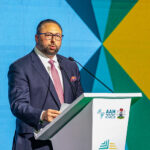Sirleaf, Clark urge leaders to protect world from pandemic threats
Her Excellency Ellen Johnson Sirleaf and Rt Hon. Helen Clark have called on political leaders to commit to reforms in six essential areas in order to transform the international system for pandemic preparedness and response.
They made the call in a statement on end of COVID-19 as a public health emergency of international concern.
The News Agency of Nigeria (NAN) reports that Sirleaf is a former President of Liberia, and Clark, a former Prime Minister of New Zealand.
They were Co-Chairs of the Independent Panel for Pandemic Preparedness and Response which reported to the World Health Assembly in May 2021 on lessons learnt from the international response to COVID-19.

In the statement, they said that the COVID-19 global emergency though declared over, and had been a global catastrophe.
According to them, the toll of the COVID-19 pandemic demands that global leaders commit to transformative reforms to protect the world from pandemic threats especially as the current system for pandemic preparedness and response remain fatally broken.
“ COVID-19 has led to the deaths of some twenty million people, causing long-lasting physical and mental health impacts.
“It also battered health workers and systems, slowed and reversed the gains made on the Sustainable Development Goals, has led to multiple trillions in economic losses, and weakened social cohesion in many countries.
“Recovery will take years, especially for lower-income countries, alongside now having permanent costs associated with managing a now endemic disease.
“Another such pandemic must not happen again.’’
Proffering solutions to fix the system, the duo made recommendations in a new report titled “A Road Map for a World Protected from Pandemic Threats”. https://live-the-independent-panel.pantheonsite.io/wp-content/uploads/2023/05/Final-Road-Map-Report_May-2023_Interactive.pdf
They said that their role as Co-Chairs of the Independent Panel for Pandemic Preparedness and Response, necessitated their evidence-based recommendations for transformative change.
“We continue to advocate for them because we believe the current rates and ambition of reform will not prevent another pandemic catastrophe.
“Leaders must seize the opportunity at the UN General Assembly High-Level Meeting on Pandemic Prevention, Preparedness and Response on Sept. 20, 2023.
“The six areas requiring UNGA commitment are: Political leadership from Presidents and Prime Ministers, International rules for pandemic prevention, preparedness, and response as well as Independent monitoring.
“ An equitable, operational ecosystem for pandemic countermeasures, Sufficient financing for preparedness and for crisis response; and an independent, authoritative WHO’’
Explaining further, “Pandemic threats are complex global crises with impacts extending well beyond the health sector.
“They are economic, social, and security matters.
“The gap in high-level coordinated leadership was one of the major failures that led to the catastrophic multi sectoral impacts of COVID-19.
“Therefore, former Independent Panel members and many others continue to call for an independent high-level global health threats council, comprised of Heads of States and Government, to ensure sustained multi-sectoral focus on pandemic preparedness and response.
“The cycle of panic and neglect must be broken for good.’’
According to them, the World Health Assembly processes toward negotiation of a pandemic accord and amended International Health Regulations should be fully supported.
This is to reach successful conclusion, with rules that serve to detect, report, investigate, and stop pandemic threats wherever they occur.
On independent monitoring, to promote accountability, a fully independent, multi-sectoral expert monitoring board should be established that would collect and analyse information from multiple sources, and regularly publish public reports.
On equitable, operational ecosystem for pandemic countermeasures, they suggested that it should be based on a global commons model, regional resilience, openness, and technology sharing.
“It must begin with regional research and development of diagnostics, vaccines, and therapies that can stop outbreaks when and where they occur’’.
They said that sufficient and additional financing for preparedness and for crisis response was required in comparison to the trillions in losses caused by COVID-19.
“For preparedness, US$10.5 billion is required annually for low- and middle-income countries.
“ So far only around 10% of that has been committed to The Pandemic Fund.
“For emergencies, US$50-$100 billion must be made available immediately when a threat emerges to protect low- and middle-income countries from catastrophic economic and fiscal crises, and ensure purchase of pandemic supplies.
“A mechanism to identify and trigger those funds must be urgently agreed.’’
The duo recommended an independent, authoritative WHO to tackle the next health threat with pandemic potential and Member States must support WHO to have the authority, independence, and funding required to play its essential role.
“To support countries to minimise the risks of health emergencies, and to minimise their consequences.’’
NAN also reports that the former Co-Chairs led The Independent Panel for Pandemic Preparedness and Response together with 11 distinguished panelists.
In May 2021 the Co-Chairs submitted their evidence-based landmark report entitled COVID-19: Make it the Last Pandemic to the World Health Assembly.
They made recommendations which, taken as a package, could transform the international system in a way that could make it the last pandemic of such devastation.
The Independent Panel was established by the World Health Organisation (WHO) Director-General in response to the World Health Assembly resolution 73.1 issued in May 2020.
The recommendations of The Independent Panel for Pandemic Preparedness and Response have helped to lay the groundwork for ongoing reforms to the international system.
Former Independent Panel Co-Chairs and members continue to advocate for implementation of the full package of recommendations due to concerns about the failure to implement recommendations of past high-level reviews of major outbreaks.
Their interest is to see a fit-for-purpose, transformed, and effective international system for pandemic preparedness and response.
The former Co-Chairs and members continue to do this work in their own time because of the serious implications of lack of transformative change being made. (NAN) www.nannews.ng
Edited by Vivian Ihechu
Published By
Has also recently published
 Economy/BusinessJuly 3, 2025Jason Miller outlines Trump’s Africa trade vision
Economy/BusinessJuly 3, 2025Jason Miller outlines Trump’s Africa trade vision General NewsJuly 3, 2025Structured finance evolving to meet Africa’s changing economic landscape – Oramah
General NewsJuly 3, 2025Structured finance evolving to meet Africa’s changing economic landscape – Oramah HealthJuly 3, 2025Lawmakers call for end to foreign dependencies in health financing
HealthJuly 3, 2025Lawmakers call for end to foreign dependencies in health financing Culture & TourismJuly 3, 2025Don calls for investment in tourism to reduce oil dependency, boost economy
Culture & TourismJuly 3, 2025Don calls for investment in tourism to reduce oil dependency, boost economy



